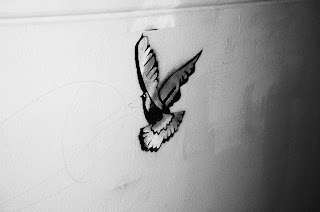This Is Not Art!
That's right. I'm at the TiNA festival in Newcastle. This is the 11th TiNA and it's been a pretty fantastic festival so far. The festival includes The Crack Theatre Festival, Electrofringe, Sound Summit, Critical Animals and the National Young Writers' Festival. Bucketloads of artists have descended on Newcastle for the weekend. The weather has been getting progressively worse, but the events are exciting and dynamic and the people are lovely.
I thought I'd post a few of the events here so you guys can get an idea of the kind of issues being discussed by young artists in Australia.
Writers Centres: next evolution? - a roundtable discussion on the direction in which writers centres are headed.
Critiquing Criticism: I can't believe it's not better - a panel discussion on the role of the critic - nurturer or discerner - and the state of criticism.
Writing Outside Gender - panel discussion looking at the radical potential of sex/gender diverse narratives told by sex/gender diverse folk.
Fictional Apocalypses - creating fictional apocalypses using ideas and events from history.
What's 'Published'? - a panel discussion on what constitutes 'published' in this digital world..
Melbourne Trashthetics - a panel discussion on Melbourne's trash aesthetic: where did it come from and where will it lead?
Women of Letters - special panel event with Michaela McGuire, Marieke Hardy, Anna Krien, Anna Barnes, Karen Hitchcock and Krissy Kneen - celebrating the lost art of letter-writing.
Words that Sell - a workshop on making money from your words.
The Woolworths Application Form was too Complicated: How I got into theatre - a forum on why we keep struggling on.
Token Effnik: Where are all the non-whiteys on TV? - a panel discussion on the dearth of non-White talent on Australian TV.
'i'm a writer, but nothing's ever happened to me' - a panel discussion with the voiceworks crew. Does experience count for everything? Or is there enough extraordinary in the everyday?
Vampires, Detectives and Rocket Ships: Oh My? - a panel discussion on the rise of genre fiction. Are the literati just snobs? Is it possible to be both literary and mainstream?
Breaking the Rules - a workshop that mucks around with words and smashes structure.
DIY New Media: A Survival Guide for Student Publications
The Expat Elite - a panel discussion on the pros and cons of taking your art offshore.
I should have read that by now - artists 'fess up about the books they really should have read by now...but haven't.
Vices - are they a help or a hindrance when it comes to writing?
Famous Bullshit Stories - featuring yours truly :-)
-------------------
So there you have it. A snapshot of what kind of stuff is going on in the world of emerging Australian art. I've only scratched the surface. There's a whole lot more going on. Many of the people here are disgustingly prolific. It's a swift kick watching what other people are up to. So, I'm going to get back to work on this novel of mine. And if you're working on something, keep at it. If you're not and you'd like to be, BEGIN!
Exciting times.
Hope you're all well. See you soon.
Ciao!
Simon
Ps. Pictures soon. I'm shooting in colour this weekend.

